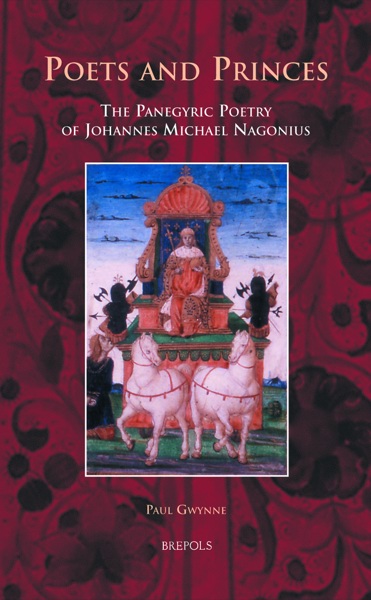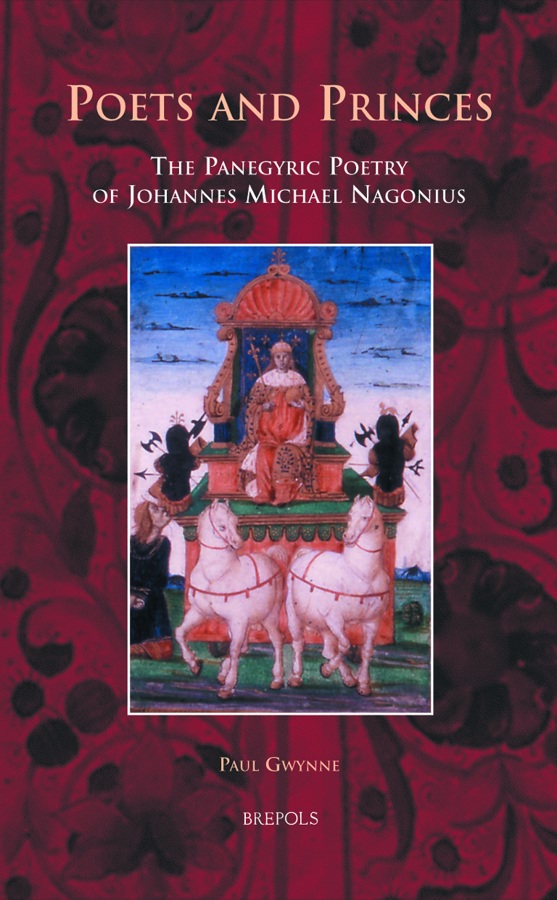- Pages: 552 p.
- Size:156 x 234 mm
- Illustrations:30 b/w, 8 col.
- Language(s):English
- Publication Year:2012
- € 180,00 EXCL. VAT RETAIL PRICE
- ISBN: 978-2-503-53160-1
- Hardback
- Available
- € 180,00 EXCL. VAT RETAIL PRICE
- ISBN: 978-2-503-57363-2
- E-book
- Available
"The major strenght of this book is the masterful combination of the historical and literary approaches, which reveals the importance of Nagonius's poetry within its political, historical, and social context. (...) What makes Poets and Princes stand out is Gwynne's extensive and exhaustive research, and the exquisite organization of the material, which is analyzed for its literary value and presented through an historical perspective. This valuable book is excellent in conception and execution. (...) Gwynne revives the figure of Nagonius as a poet within his intellectual, social, cultural and political context, making this book interesting for scholars of Renaissance literature, culture, and history, as well as scholars of the classical tradition." (Lilia Campana, in: Neo-Latin News, 63, 1&2, 2015, p. 64-66)
Poets and Princes offers a richly textured interdisciplinary survey of late medieval and early Renaissance court cultures across Europe as they are reflected in the neo-Latin verse of the itinerant poet, Johannes Michael Nagonius. In 1496 the poet laureate Nagonius presented Henry VII with a manuscript of Latin panegyric poetry. This elaborate diplomatic gift from Pope Alexander VI solicited the King’s support against Charles VIII of France. The verse emphasized the mutual benefit of an alliance: if Henry supported him the Pope would acknowledge disputed Tudor claims to England’s throne. For Henry, the gift represented a literary and political coup. With all the rhetorical skill of a learned poet, Nagonius presented the King as a classical hero on an epic scale in the latest Italian style. The work thus acknowledged Henry’s international significance. Other recipients of Nagonius’s panegyric verse include Holy Roman Emperor Maximilian I, Vladislav II of Bohemia, Louis XII of France, Doge Leonardo Loredan, the condottieri Niccolò Orsini and Gian Giacomo Trivulzio, Giovanni Bentivoglio, lord of Bologna, and Duke Ercole d’Este of Ferrara. The presentation of a deluxe manuscript to Julius II, celebrating the pontiff ’s campaign in the Romagna, marked the climax of the poet’s career.
This analysis of the life and works of Nagonius thus provides a fascinating insight into the world of late medieval and early Renaissance court cultures. It contributes to the growing field of neo-Latin scholarship, examining the manuscripts and para-texts, studying the relationship between volume and dedicatee, placing these manuscripts within the wider literary and artistic cultures of the courts where they were presented, and investigating the role of neo-Latin verse within court cultures.
Paul Gwynne received his Ph.D. in Combined Historical Studies from the Warburg Institute, University of London. His research interests include the reception of the Classical Tradition with particular emphasis on the development of Humanism in Renaissance Rome.
- Acknowledgements
- List of Abbreviations
- Classical Authors and Texts
- List of Illustrations
- The Scope of this Book
- A Note on the Transcriptions
- Towards a Biography of Johannes Michael Nagonius
- The ‘Biography’ of Giovanni Michele Pingonio
Chapter 2. Iam nova progenies caelo demittitur alto
- Latin Panegyric Poetry
- The Renaissance Theory of Panegyric
- The Gift of Immortality
- Nagonius and the Panegyric Tradition
- The Adventus of Piotr Vapowski, 1493
- ‘Sic ego sum Caesar Maximilianus orbis herus ’: A Manuscript for Maximilian, 1494
- A Renaissance Court in England: A Manuscript for Henry VII, 1496
- A Manuscript for Vladislav II, 1497
- Conclusion
: A Manuscript for Louis XII, 1499
- A Manuscript for Doge Leonardo Loredan, c. 1503
- ‘Tu alter Caesar eris’ : A Manuscript for Niccolo Orsini, 1507
- A Compendium of Roman History: A Manuscript for Andrea Gritti, 1502
- Chapter 6. The Last Crusade
- ‘Hierusalem miserere tuae’ : A Manuscript for Pope Julius II, 1509
- A Strategy for Recognition
- Decoration and Illumination
- The Identity of the Illuminators
- A Note on the Script
- A Note on the Watermarks
Part III: Panegyric Compositions and Catalogue
Chapter 9. A Selection of the Panegyric Compositions of Nagonius
- The Senators and Matrons of Rome
- The Oration and Verses to Welcome Piotr Vapowski to Rome
- Dedicatory Letter to Maximilian I
- A Hunting Expedition among the Ruins of Ancient Rome
- Epigrams for Philip, Archduke of Burgundy, and Arthur, Prince of Wales
- Descriptions of Buda, Jerusalem, and Constantinople
- The Battle of Fornovo
- An Epithalamium for Guglielmo II, Marquis of Monferrat, and Anne D’Alencon
- The Foundation of Venice by Antenor
- The Venetian Senate
- The Vision of Francesco Maria della Rovere
Manuscripts
- Vienna, Osterreichische Nationalbibliothek, MS 12.750 (suppl. 350)
- York, Minster Library, MS XVI.N.2
- Prague, Narodni a Universitni Knihovna, MS VIII. H.76 (1659)
- Paris, Bibliotheque nationale de France, MS lat. 8132
- Paris, Bibliotheque nationale de France, MS lat. 8133
- Modena, Biblioteca Estense Universitaria, MS Est. lat. 234 (α.M.5.2)
- Turin, Biblioteca Nazionale, MS F.V.5.
- Milan, Biblioteca Ambrosiana,
- MS Fondo Cimelii I.165 inf.
- Citta del Vaticano, Biblioteca Apostolica Vaticana, MS Vat. lat. 5213
- Venice, Biblioteca Nazionale Marciana, MS lat. XII, 75 (=3950)
- Venice, Biblioteca Nazionale Marciana, MS lat. Z. 407 (=1585)
- Citta del Vaticano, Biblioteca Apostolica Vaticana, MS Vat. lat. 1682
- Venice, Biblioteca Nazionale Marciana, MS lat. X. 253 (=3751)
- Six Books of Poems Dedicated to Giovanni Bentivoglio of Bologna
- Book of Poems Dedicated to Gian Giacomo Trivulzio
- Poznań, Biblioteka Narodowa, E.XXIII.39
- Bibliography
- Index Locorum Citatorum
- Index of Proper Names

